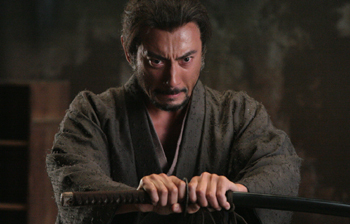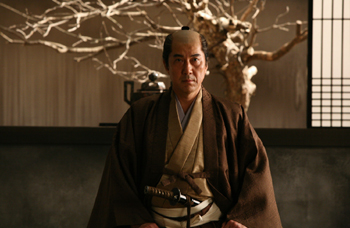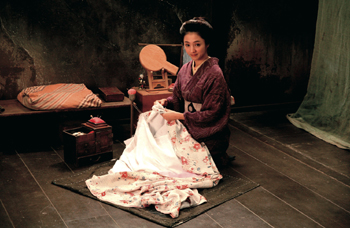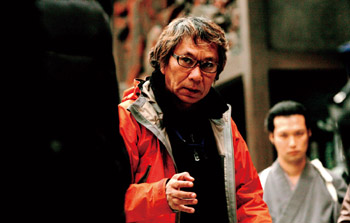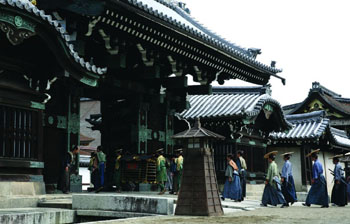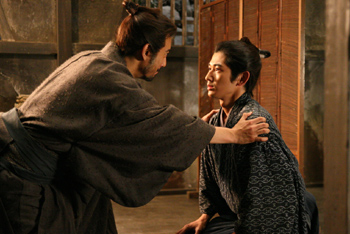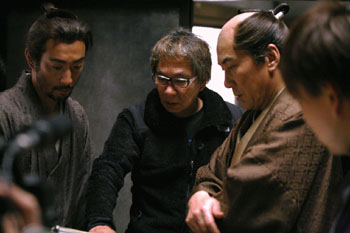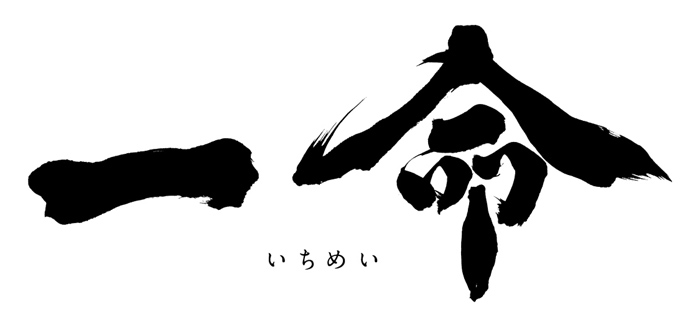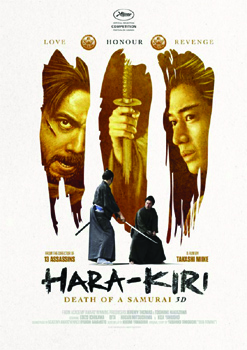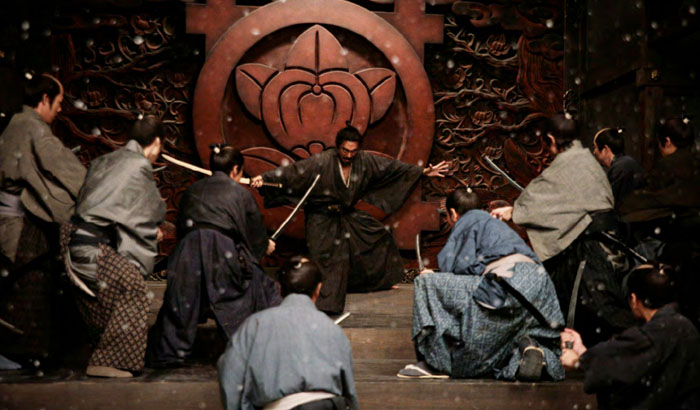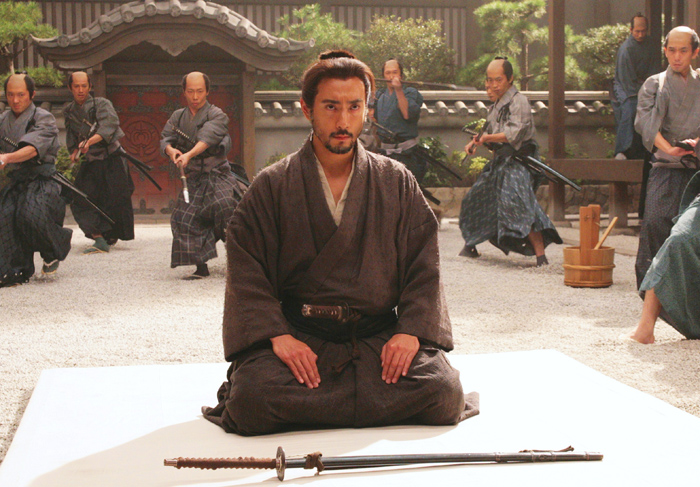 Samurai Hanshiro Tsukumo (Ebizo Ichikawa) plans to end his life with a final act of vengeance in Takashi Miike`s HARA-KIRI: DEATH OF A SAMURAI. Photo courtesy of Shochiku Co., Ltd. © 2011 Ichimei Film Partners
Samurai Hanshiro Tsukumo (Ebizo Ichikawa) plans to end his life with a final act of vengeance in Takashi Miike`s HARA-KIRI: DEATH OF A SAMURAI. Photo courtesy of Shochiku Co., Ltd. © 2011 Ichimei Film PartnersTakashi Miike Remakes Cult Classic in 3D Source: Shochiku Co., Ltd., FilmPressPlus Official Site: ichimei.jp (Japan) Special Thanks to Richard Lormand
SPOILER WARNING: This article contains plot details and images from a Japanese movie not yet released in the United States.
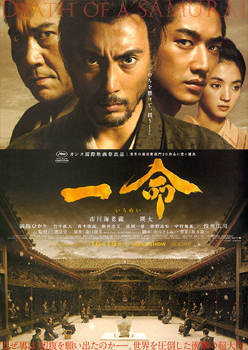 Theatrical poster for HARA-KIRI: DEATH OF A SAMURAI. Photo courtesy of Shochiku Co., Ltd. © 2011 Ichimei Film Partners
Theatrical poster for HARA-KIRI: DEATH OF A SAMURAI. Photo courtesy of Shochiku Co., Ltd. © 2011 Ichimei Film PartnersHARA-KIRI: DEATH OF A SAMURAI (??, Ichimei, 2011) is director Takashi Miike`s (AUDITION, 13 ASSASSINS) remake of Masaki Kobayashi’s cult classic HARAKIRI (??, Seppuku, 1962). It was the first 3D movie to compete for the Palme d`Or at the Cannes Film Festival. Released in Japan in late 2011, the film received a limited theatrical run in the UK this past May from Revolver Entertainment and will open in Australia on August 23rd from Icon Films. Plans for distribution in North American have not yet been announced. SciFi Japan presents a look at HARA-KIRI: DEATH OF A SAMURAI with press notes and images courtesy of Shochiku and the film`s international press agent, FilmPressPlus...
SYNOPSIS
Seeking a noble end, poverty-stricken samurai Hanshiro requests to commit ritual suicide at the House of Ii, run by headstrong Kageyu. Trying to dismiss Hanshiro’s demand, Kageyu recounts the tragic story of a similar recent plea from young ronin Motome. Peaceful times in Edo (ancient Tokyo) have resulted in massive ronin unemployment, and those who cannot find new samurai positions are condemned to poverty. Many turn to petty extortion by threatening to commit hara-kiri at a noble house in the hope of receiving a handout to leave the owners in peace. With this in mind, desperate Motome calls on the House of Ii to try and save his sickly wife and dying baby. But Kageyu’s samurai convince him to make an example of Motome and call his bluff. Dreadfully, Motome has long sold his sword and is forced into an agonizing suicide using a bamboo blade. Hanshiro is shocked by the horrifying details of Motome’s fate, but remains true to his decision to die with honor. At the moment of the hara-kiri, Hanshiro makes a last request to be assisted by Kageyu’s samurai who are coincidentally absent. Suspicious and outraged, Kageyu demands an explanation. Hanshiro confesses his bond to Motome and tells the bittersweet tale of their lives... Kageyu will soon realise that Hanshiro has set in motion a tense showdown of vengeance against his house...
PRINCIPAL CAST
Ebizo Ichikawa as Hanshiro Ebizo Ichikawa was born December 6, 1977, in Tokyo. One of the kabuki world’s most prominent figures, he made his first acting appearance in 1983, at the Kabuki-za Theater in the role of Harunomiya in THE TALE OF GENJI. In 1985 he appeared there as Kikanbo in THE MEDICINE PEDDLER, and took the name Shinnosuke VII, as the 7th generation of Ichikawa kabuki lineage. Since then, he has appeared in numerous kabuki plays. Having appeared in roles such as Kamakura Gongoro in SHIBARAKU, he then took the name Ebizo XI in May of 2004, becoming the 11th generation Ebizo Ichikawa. He performed in Paris (Theatre National de Chaillot) in October 2004 to commemorate his succession to that name. Following that, he was actively involved in appearances outside of Japan, such as in the PARIS OPERA HOUSE SHOCHIKU GRAND KABUKI (2007), and was awarded the French Order of Culture that year. He also appeared in SHOCHIKU GRAND KABUKI performances in London and Rome in 2010. Apart from kabuki, he has been active in a variety of roles, including the protagonist, Miyamoto Musashi, in the NHK TV historical drama series MUSASHI (2003).
Eita as Motome Eita was born December 13, 1982, in Tokyo. He made his movie debut in BLUE SPRING (2002). His first role as the protagonist in a movie was in SUMMER TIME MACHINE BLUES (2005), followed by many roles in TV and film, and then became popular throughout Japan due to his appearance in the NHK TV historical drama series ATSUHIME (2008). He appeared in various movies, including MEMORIES OF MATSUKO (2006), THE FOREIGN DUCK, the NATIVE DUCK AND GOD (2007), APRIL BRIDE (2009), and NODAME CANTABILE: THE MOVIE I / II (2009 / 2010), which had strong followings among young men. He also appeared in many popular movies such as TOAD’S OIL (2009), DEAR DOCTOR (2009), NO MORE CRY (2009), and received numerous awards for his co-starring roles. In 2011 he is scheduled to appear in MAHORO EKIMAE TADA BENRIKEN and TAKE THE ‘A’ TRAIN, among others, and is destined to be one of Japan’s leading young actors.
Koji Yakusho as Kageyu Koji Yakusho was born January 1, 1956, in Nagasaki Prefecture. In 1996 he received an astounding 14 awards for his leading roles in the movies SHALL WE DANCE?, SLEEPING MAN, and SHABU GOKUDO. He has appeared in numerous films that were shown in international film festivals, including THE EEL (1997, Cannes Film Festival Palm d’Or winner), ALLEY CAT (2000), EUREKA (2001, Cannes Film Festival FIPRESCI Prize, Prize of the Ecumenical Jury), and WARM WATER UNDER A RED BRIDGE (2001, Chicago Film Festival Best Actor). He has also appeared in various highly-acclaimed non-Japanese movies, including MEMOIRS OF A GEISHA (2005), and BABEL (2007, Golden Globe for Best Picture). In 2009 he broadened his scope by achieving his directorial debut with TOAD’S OIL. In 2010 he appeared in the well-known movies 13 ASSASSINS and THE LAST RONIN.
Hikari Mitsushima as Miho Hikari Mitsushima was born November 30, 1985, in Okinawa Prefecture. After making her debut in the music group Folder, she made her movie debut in REBIRTH OF MOTHRA II (1997). She then appeared in DEATH NOTE and DEATH NOTE: THE LAST NAME (2006), and also made numerous appearances in television dramas and on stage. Her appearances in LOVE EXPOSURE (2008), PRIDE (2009), and THE WONDERFUL WORLD OF CAPTAIN KUHIO (2009) were highly-acclaimed, leading to numerous awards including the Hochi Film Awards Best New Talent and the Kinema Junpo Awards Best 10 Supporting Actress Award. In 2010 she appeared in several movies, including RINCO’S RESTAURANT, A PIECE OF OUR LIFE, and SAWAKO DECIDES, and won Supporting Actress Award by the Japan Academy Prize for her role in the much acclaimed movie, VILLAIN. At present she is considered to be one of Japan’s most promising young actresses. In 2011 she appeared in this film plus RABBIT HORROR 3D and SMUGGLER.
DIRECTOR: TAKASHI MIIKE
Takashi Miike has become synonymous with the promise of a unique onscreen experience, regardless of the genre. Highly prolific, Miike is credited with over 80 films since making his directorial debut in the early 90s. Landmark films in Miike’s illustrious career include: AUDITION, ICHI THE KILLER, ONE MISSED CALL, THE GREAT YOKAI WAR, THE CITY OF LOST SOULS, VISITOR Q, GRAVEYARD OF HONOR, SUKIYAKI WESTERN DJANGO, YATTERMAN, the CROWS ZERO films and the DEAD OR ALIVE yakuza trilogy. Although his films are often associated with black humour, inventive violence and audacious style, Miike has shown his versatility in other genres: children’s films (ZEBRAMAN), sensitive dramas (THE BIRD PEOPLE IN CHINA), period pieces (SABU) and even a horror musical (THE HAPPINESS OF THE KATAKURIS). Born in 1960 near Osaka, Miike harboured a passion for motorbike racing and a disdain for academics growing up. He attended the Yokohama Vocational School of Broadcast and Film and then worked for nearly a decade in television. Miike became an assistant director in film to directors like Shohei Imamura and Hideo Onchi, and Japan’s “V-Cinema” (direct to video) boom of the early 90s helped his break into directing his own films. For years, he alternated between V-Cinema and higher-budget productions. In 2005, Miike directed DEMON POND, a Kabuki-style play. Miike has also occasionally appeared as an actor in his films as well as others’, notably Eli Roth’s HOSTEL. Miike’s samurai epic 13 ASSASSINS, screened in Competition at the 2010 Venice Film festival.
COMMENTS FROM TAKASHI MIIKE
WHAT KINDLES YOUR HEART It just so happened that this kind of epic film was my next film after 13 ASSASSINS. I don’t plan to make only films like this. The touchstone benchmark is quality over quantity. By quality, I mean what kindles your heart or whether or not it makes you feel free as you devote yourself to the filming. Next fall, I will shoot a TV drama for late night television that is ruinously low-budget. But with low-budget works comes an excitement that can only be relished through low-budget.
HUMAN SUFFERING What excites me about ressurecting this film from the past is being able to feel first hand the existence of the universal human suffering which HARA-KIRI: DEATH OF A SAMURAI depicts at its core as it transcends time, genres and countries. FOOLISHNESS AND SADNESS I guess what attracted me to the theme of ICHIMEI was the foolishness and sadness of not being able to accurately perceive one’s self in the next tomorrow. I guess for me, even after seeing this film, you feel pity for the tragedy of the main character and feel the sadness that makes tears of compassion and sympathy for somebody else’s problem flow from your eyes. But I guess audiences who see the film will feel different messages based on their own reality. I don’t think a director can steal that freedom away from them.
CONNECTED IN TANDEM My new versions share everything in common with the old films yet everything is a little off. Since things like originality or being finicky about some worthless triviality were thrown away a long time ago, one cannot compare two works by lining them up next to each other. They are only connected in tandem as part of the flow of time in which they were created. JEALOUSY I don’t feel nostalgic about old Japanese films; I feel jealousy. Jealous because the staff that made those films had everything that modern day Japanese filmmakers have lost. Things like their energy and passion, the old studios that were overflowing with dreams and people making these dreams happen, the studio’s investment in human resources and the like. EBIZO ICHIKAWA (Hanshiro) Ebizo Ichikawa is the real deal when it comes to being the prize of kabuki. He is the king of traditional performing arts in Japan. He is a man without a net challenging frontiers with a great deal of curiosity. He made the set a fun, stimulating place day after day. I am looking forward to even more exciting things from him.
EITA (Motome) Eita holds the charisma of youth. His appeal is his subtle sensitivity and depth in his presence. On the surface, he appears quiet and kind, but amid that stillness lies a knife with an incredible cutting edge which contributes to his sharp performance. KOJI YAKUSHO (Kageyu) Koji Yakusho is a living treasure in Japanese film. He always seams up the frayed edges in my clumsy directing in an artful way. He is a living treasure of modern Japanese film who leads you into the special world of filmmaking. He always teaches me Japan’s unique virtue of humility. Also, his wife is a lovely lady filled with elegance. SHOOTING IN 3D Nothing changed for me shooting a movie in 3D. It was the same on set experience as any other film for me. The only difference was that the speed of shooting was slightly slower than normal. All in all, this film will probably be a welcomed development for those who already pursue stereo spatial visuals in the world of 2D via lightening and camera angles. There was no change to my approach other than I was able to go brag to the director shooting at the studio next door and say, “Huh? Yours is flat and level? Ours is bumpy and convexo-concave.”
EXPECTATIONS I would be most pleased if the audience feels that what can be expressed in 2D can also be expressed in 3D. For the people who are not fans of 3D, I hope they will say, “Wow! 3D works.” It would be perfect if older audiences would say, “How interesting the way this film bursts out and sucks me up.” I guess for the next few years this situation will continue where 3D is just one option for making a movie. And the audiences will probably decide and determine what happens after that. I definitely anticipate making more 3D movies. Next, if I have the chance, I want to have things that shouldn’t come out of our bodies be hurled at the audience. MUSIC BY RYUICHI SAKAMOTO From the bottom of my heart, I really appreciated Ryuichi Sakamoto providing such wonderful music. The souls of the characters in the film squeal in the soundtrack. And these sounds aren’t rammed down-your-throat and don’t really come so far forward. His music fills the theatre like air with a certain stillness and quietness yet its sureness and authority remain. Ryuichi Sakamoto is an artist who sees through the deception of the essence of 3D.
ORIGINAL SCORE: RYUICHI SAKAMOTO
Ryuichi Sakamoto was born January 17, 1952, in Tokyo. He graduated from the Master’s Course of the Graduate School of the Tokyo University of the Arts. In 1978 he released his debut album, Thousand Knives. That same year he formed Yellow Magic Orchestra (YMO) with Haruomi Hosono and Yukihiro Takahashi. Following the dissolution of that band, he has been extremely active in a wide range of media, including music, film, publishing, and advertising. In 1984 he received the British Academy of Film and Television Arts (BAFTA) Best Score Award for MERRY CHRISTMAS, MR. LAWRENCE, in which he acted and also directed the music. For THE LAST EMPEROR (1987) he received numerous awards, including an Academy Award and a Grammy. Since then, his career has been based in America and Europe. Following the production of his 1999 opera, LIFE, he has been an active spokesperson in issues pertaining to the environment and world peace. In response to the twin terror attacks of 9/11 in America, he supervised an anthology of collected studies, “NO WAR.” He founded the Artists’ Power organization for artists, which is dedicated to the advocacy of using natural forms of alternative energy, as well as being actively involved in a variety of causes.
COMPANY PROFILES
Hanway Films Hanway Films is a leading international sales, distribution and marketing company. HanWay arranges financing, sales and distribution for all films from Recorded Picture Company and other leading independent producers. The company’s current slate includes David Cronenberg’s A DANGEROUS METHOD starring Viggo Mortensen, Keira Knightley, Michael Fassbender and Vincent Cassel; Wim Wenders’ 3D dance film PINA ; Takashi Miike’s samurai epics HARA-KIRI: DEATH OF A SAMURAI 3D and 13 ASSASSINS; GREAT EXPECTATIONS starring Helena Bonham-Carter, Ralph Fiennes and Jeremy Irvine; KON-TIKI -- an epic adventure from directors Joachim Roenning and Espen Sandberg; GIRLS’ NIGHT OUT from director Michael Hoffman starring Dakota Fanning; romantic comedy THE DECOY BRIDE starring Kelly MacDonald and David Tennant; Andrea Arnold’s WUTHERING HEIGHTS; Steve McQueen’s SHAME starring Michael Fassbender and Carey Mulligan and produced by the Academy Award-winning team behind THE KING’S SPEECH; Kevin MacDonald’s groundbreaking documentary A LIFE IN A DAY produced by Ridley Scott. Record Picture Company Record Picture Company was established by Jeremy Thomas in 1974 and has been involved in over 50 films, including Bernardo Bertolucci’s nine-time Academy Award winner THE LAST EMPEROR. RPC’s body of work is characterised by its intimate director relationships. Film greats such as David Cronenberg, Nic Roeg, Stephen Frears, Bernardo Bertolucci, Terry Gilliam and Takeshi Kitano, amongst others, have long-standing relationships with the company. Notable productions include THE SHELTERING SKY and MERRY CHRISTMAS MR LAWRENCE, and more recently, SEXY BEAST, CRASH, YOUNG ADAM and THE DREAMERS. At the 2010 Venice Film Festival, RPC premiered Takashi Miike’s 13 ASSASSINS with Sedic International, along with Jerzy Skolimowski’s ESSENTIAL KILLING, which went on to garner the Jury Prize and two others in an unprecedented triple win. In 2011, RPC released David Cronenberg’s A DANGEROUS METHOD, starring Viggo Mortensen, Keira Knightley, Michael Fassbender and Vincent Cassel, and Wim Wenders’ 3D film PINA. Upcoming projects include those by Vincenzo Natali and Phillip Noyce. Shochiku Founded in 1895, Shochiku functions as a highly-tuned vertically integrated entertainment entity, encompassing feature film and television production, theatrical distribution of Japanese & foreign motion pictures, worldwide sales, exhibition, videogram & home entertainment distribution, and the theater stage production and distribution, including the Kabuki Theater. Shochiku operates one of the most successful motion picture divisions in Japan. The company has produced a number of critically and financially successful films, including the 2009 Academy Award® Winner for Best Foreign Language Film DEPARTURES by Yojiro Takita, and 2004 Academy Award nominee for Best Foreign Language Film THE TWILIGHT SAMURAI directed by Yoji Yamada.
CREDITS
Running Time: 126 Minutes Format: 3D World Premiere: May 19, 2011 (Cannes Film Festival) Japanese Theatrical Release: October 15, 2011 Main Cast Hanshiro Tsukumo: Ebizo Ichikawa Motome Chijiiwa: Eita Miho: Hikari Mitsushima Tajiri: Naoto Takenaka Hikokuro Omodaka: Munetaka Aoki Hayatonosho Matsusaki: Hirofumi Arai Umanosuke Kawabe: Kazuki Namioka Sasaki: Yoshihisa Amano lord Ii Kamonnokami Naotaka: Takehiro Hira Naito: Ippei Takahashi Fujita: Ayumu Saito Landlord: Goro Daimon Priest: Takashi Sasano Jinnai Chijiiwa: Baijaku Nakamura Kageyu Saito: Koji Yakusho Main Crew Director: Takashi Miike Original Story by: Yasuhiko Takibuchi Screenplay: Kikumi Yamagishi Music: Ryuichi Sakamoto Produced by: Toshiaki Nakazawa, Jeremy Thomas Executive Producers: Yo Hattori, Suketsugu Noda, Yoshio Irie, Toshiaki Okuno, Akemiko Noguchi, Eiichi Noguchi, Tatsuro Hatanaka, Tomoko Machida, Hiroaki Kitano Producers: Toichiro Shiraishi, Shingo Sekine, Toru Hattori, Kensuke Zushi, Yasushi Uchida, Shinjiro Yokoyama, Misako Saka, Sigeji Maeda Cinematographer: Nobuyasu Kita Lighting Designer: Yoshimi Watabe Sound Recordist: Jun Nakamura Art Designer: Yuji Hayashida Set Decoration: Akira Sakamoto, Kazuto Kagoo Editor: Kenji Yamashita Sound Effects: Kenji Shibazaki Sword Action Coordinator: Keiji Tsujii Costume Designer: Kazuko Kurosawa Line Producers: Tomoyuki Imai, Toshiki Komatsu Casting Producer: Yuriko Kitada Art Coordinator: Yasuto Takemura Co-Line Producer: Noriko Koyanagi Associate Producer: Tetsuya Fujimura Assistant Director: Ryosuke Kanesaki Production Manager: Shinya Zenda Production Companies: OLM, Sedic International, Recorded Picture Company, Shochiku International Sales: Hanway Films © 2011 Ichimei Film Partners
For more information on HARA-KIRI: DEATH OF A SAMURAI, please see the previous coverage here on SciFi Japan:
- Takashi Miike`s HARA-KIRI: DEATH OF A SAMURAI Gets UK Release in May
- HARA-KIRI: DEATH OF A SAMURAI Trailer


